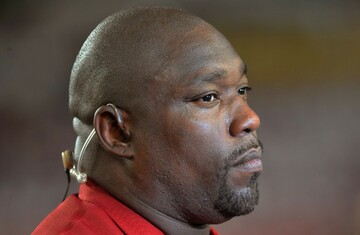HALL OF FAME defensive tackle Warren Sapp announced Tuesday that he will donate his brain to the Concussion Legacy Foundation after he dies.
The announcement was made in a video and statement from Sapp published at The Players’ Tribune.
Sapp says his decision was largely influenced by an email he received from Fred Willis, a former NFL running back from the 1970s.
According to Sapp, the email contained quotes from NFL owners disputing the notion that there was any correlation between the head trauma that comes with the game and the negative consequences many players were experiencing after leaving the league.
“I mean down the line you could see it,” Sapp says. “‘There’s no correlation between football, CTE, suicides, and all this foolish stuff.’ I mean where are you getting this information from? And then spewing it out as if it’s fact.”
Sapp goes on to detail some of the troubles he’s been experiencing personally with memory loss and function since leaving the league.
You try to [say], ‘All right, I’m gonna get a little more sleep — maybe it’s something I did last night, maybe something I drank,’ or whatever it is. You try to find a reason that it’s not that it’s my brain, that I’m not deteriorating right before my own eyes.”
It’s the most frightening feeling, but it’s also a very weakening feeling because you feel like a child. I need help. I need somebody to help me find something that I could’ve found with my eyes closed, in the dead of night, half asleep.”
Sapp also criticizes the “machoism” found throughout the NFL, and speaks to the fact that the tough exterior players feel a need to exude may keep some of them from getting help.
We play in a macho league, and we talk about Hall of Famers now who are immortalized forever — made busts and everything, legends of the game. There’s no way that any of us want to admit that we can’t remember how to get home, or a grocery list that the wife has given us, or how to go pick up our kids to the school, or whatever it may be.”
While the stories that Sapp relays are tragic, he does offer hope for the future, and believes that with research and diligence, football can be made safer for all involved, especially the kids being introduced to the sport at a young age.
You can watch the video in its entirety below.
- Tyler Lauletta, Business Insider








This doesn’t make sense, as you do need to quarantine if travelling from the USA to UK at present. With the condensed nature of Fedex Cup leading into the remaining majors, the US Open and Masters, you could count on one hand the amount of American based golfers that will travel.
@Mike Faherty: just ridiculous the idea. Hope they arrive 14 days earlier to quarantine. But doubt it will happen.
@Claudia O’Riordan: Us Open finishes 4 days before Irish, so they definitely wont be isolating for 14 days. As long as all players, caddies, coaches etc. keep getting tested as least once a week there shouldnt be a problem with anyone coming over
@Sean Dalton: can’t see any American playing in it, nor can I see any of the big european players playing 3 days after us open which is off the back of fed ex cup playoffs.
Open the pubs
@Fran O’Keeffe: jaysus that’s original… haven’t seen anyone post that before.
@Canyon: even the man who can’t think, can say that.
@Canyon: you want to get out more maybe the pub
Hoped the old head of Kinsale would showcase it this year
@Denis White: the old head is a fantastic venue but if the fog comes in, it would make for challenging viewing.
Elite athletes do not have to isolate in uk
Good call